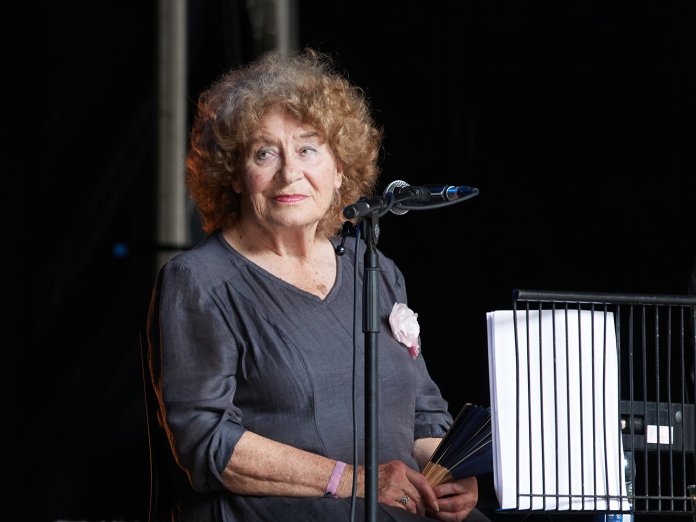Given End Of The Road’s location in the heart of the Wessex countryside, there hasn’t been much actual folk music at the festival so far. That oversight is corrected on Sunday afternoon at the Garden Stage, although Jim Ghedi’s take on traditional song is not quite the easygoing ride some had ...
Given End Of The Road’s location in the heart of the Wessex countryside, there hasn’t been much actual folk music at the festival so far. That oversight is corrected on Sunday afternoon at the Garden Stage, although Jim Ghedi’s take on traditional song is not quite the easygoing ride some had maybe hoped for while lazing against a hedge. Playing his excellent recent album In The Furrows Of Common Place from start to finish, these are ancient (or ancient-sounding) tales of impoverishment, malady and loss, accompanied by mournful violin and double bass or the ominous drone of a harmonium. It’s sometimes harrowing stuff, but beautifully delivered and warmly received.
Nothing quite beats the love shown to Shirley Collins however, a genuine national treasure and living encyclopedia of folksong. Most artists start their set with an old one, to get the crowd onside; Collins’ first number is from 1580 (written in response to an earthquake that destroyed part of St Paul’s Cathedral). There are also May songs, sheep-shearing songs, songs learned from an “Arkansas mountain woman” and a song written with Davy Graham in 1965 that Collins recently found in a drawer. Each one comes with an illuminating origin story – and some even come with a morris dancer, to the delight of the crowd. She might not be Little Simz, but Collins knows how to entertain. The cheers after each song are long and heartfelt. “Oh, aren’t you lovely!” she says.
Arab Strap, too, play a kind of folk music, a document of contemporary mores played out through lewd tales and sticky situations. Recent comeback album As Days Get Dark found Aidan Moffat moving from protagonist to narrator, and as a result its songs sometimes lack the piquant cringe factor of the band’s finest work. But their new meatier sound and professional approach – no more rolling around drunk or trying to fight each other onstage, anyway – amplifies the drama of old favourites like “New Birds” and “Love Detective”. They finish, of course, with “First Big Weekend” – as it has been for most of us.
On the main stage, Black Country, New Road gleefully underline how brilliantly weird it is that they’ve been fast-tracked to the status of festival favourites, as if they were a cheerily anthemic Brit indie band in the vein of The Zutons or The Vaccines. Instead, BCNR’s singular offering is a kind of glowering post-rock, infused with chamber pop, klezmer, jazz and god knows what else, over which Isaac Wood sifts through the detritus of 21st century culture as if he’s voicing a particularly haywire Adam Curtis doc. They’ve been playing some of these mutant ‘songs’ now for three years or more, so no surprise they have started to sprout new limbs, demanding to wander off somewhere else. And the new material sounds like an upgrade, too: more graceful, less hectoring and abrasive, Wood picking ruefully over past relationships like toast crumbs in the sheets: “You said this place is not for any man/ Nor particles of bread”.
Another heartening aspect of Black Country, New Road’s rise is how it seems to have emboldened a whole generation of new bands to do something equally eclectic or unhinged. Crack Cloud are a similarly oversized gang of mismatched oddbods, who apparently met while helping recovering drug addicts in Vancouver. Broadly, their thing is wild, raucous and occasionally silly dance-punk – a bit of Talking Heads, a bit of Fugazi, a bit of Pigbag – that threatens to explode or collapse at any moment. It doesn’t quite generate the same mania that Squid did on the same stage the previous day, but it’s close. The kids are alright.
At first it seems curious that Archy Marshall AKA King Krule is headlining the Woods Stage over the slick and charismatic Little Simz – who is surely destined for a Glastonbury headline slot sooner rather than later. Marshall makes zero concession to stage presence but gradually draws you into his cryptic, murky netherworld. Evidently uncomfortable amid the greenery, his backdrop is a cartoon cityscape; he even has a smoky sax player who periodically appears stage right to punctuate the action, as if in a classic New York noir. A well-chosen cover of Pixies’ “Wave Of Mutilation” suits the Lynchian mood.
Marshall’s louche guitar-playing and mumbled/yelled vocals can seem self-consumed but sometimes a note of compassionate wisdom leaps out: “Don’t forget you’re not alone” or “If you’re going through hell, just keep going”. Returning for an encore, he ambles into the still-astonishing blast of youthful ennui that is “Out Getting Ribs”, released when he was just 16. Then he throws down his guitar and stomps off stage. It doesn’t seem like the intervening years or the cult success has brought him much peace, but it’s fascinating watching his weird internal fires rage.
An hour or later, as sleep beckons, a familiar descending riff peals out across the festival site. It turns out to be those Black Country, New Road scamps again, playing a late-night secret set and brilliantly covering MGMT’s “Time To Pretend”. No need for pretending any more, though. As Damon Albarn noted succinctly on Friday, “it happened”. It really, really, really did happen.



